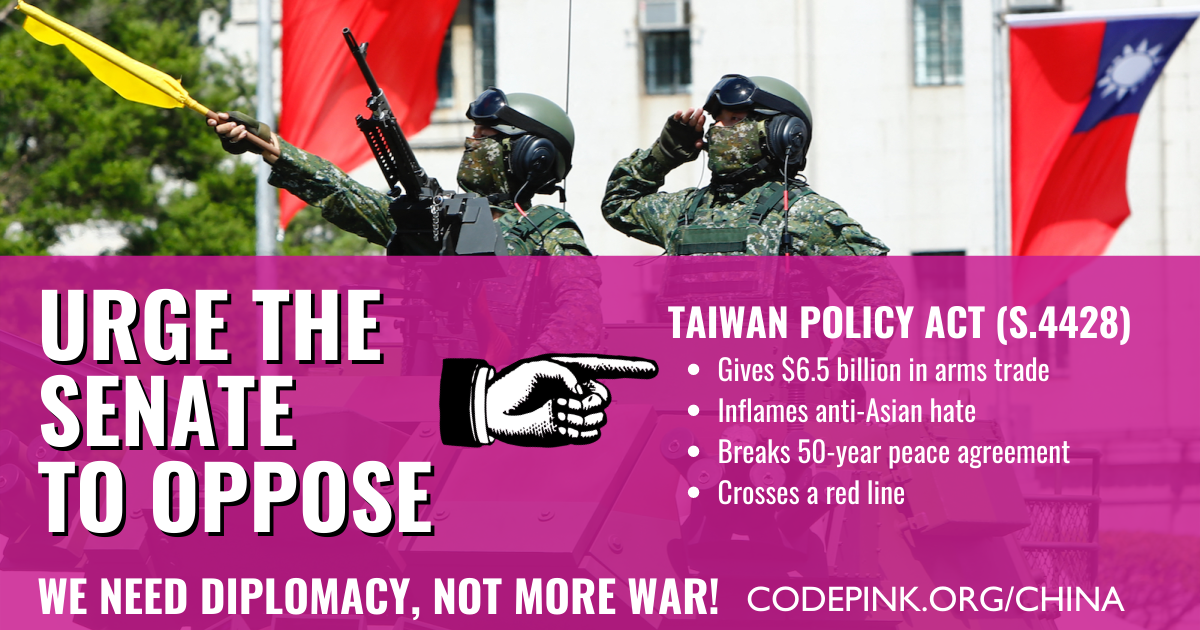Renewed Effort: Taiwan International Solidarity Act Back In US Congress

Table of Contents
Understanding the Taiwan International Solidarity Act
The Taiwan International Solidarity Act aims to significantly enhance Taiwan's participation in the international community, currently hampered by China's diplomatic pressure. The bill seeks to elevate Taiwan's global profile and strengthen its ties with the US and other democratic nations.
- Strengthening Diplomatic Ties: The Act encourages increased high-level exchanges between the US and Taiwan, fostering stronger diplomatic collaboration.
- Increasing Economic Cooperation: It promotes deeper economic engagement, including expanding trade and investment partnerships, furthering economic resilience for Taiwan.
- Promoting Taiwan's Participation in International Organizations: A key goal is to facilitate Taiwan's meaningful participation in international organizations like the World Health Organization (WHO) and the International Civil Aviation Organization (ICAO), currently denied due to China's objections. This would allow Taiwan to contribute its expertise and participate in global decision-making processes.
The Act's Renewed Momentum in Congress
The reintroduction of the Taiwan International Solidarity Act reflects a confluence of factors, including growing concerns over China's increasingly assertive actions in the region and a strengthening bipartisan consensus in the US Congress regarding Taiwan's strategic importance.
- Increased Bipartisan Support: The bill enjoys significant support from both Democrats and Republicans, signifying a broad commitment to strengthening the US-Taiwan relationship. This transcends typical partisan divides, reflecting the seriousness with which the issue is treated.
- Geopolitical Events: Recent escalations in cross-strait tensions and China's growing military might have underscored the urgency of bolstering Taiwan's defenses and international standing. The Act is seen as a crucial element in this strategy.
- Congressional Action: The bill's reintroduction has been accompanied by public statements from key Senators and Representatives emphasizing the importance of supporting Taiwan's sovereignty and its right to participate fully in the international community. Numerous committee hearings and discussions are expected to further analyze and shape the bill's progress.
Potential Implications and Challenges
The passage of the Taiwan International Solidarity Act would have far-reaching consequences, both positive and negative.
- Positive Outcomes: Increased security cooperation with the US, enhanced economic opportunities, and a stronger voice in international affairs would significantly benefit Taiwan. It would reinforce Taiwan's democratic values and resilience against external pressure.
- Negative Consequences: The Act could further escalate tensions with China, potentially leading to increased military activity in the Taiwan Strait. China's response, which is likely to be strongly negative, needs to be carefully considered and managed.
- Obstacles to Passage: While bipartisan support exists, navigating the complexities of US-China relations and overcoming potential lobbying efforts by pro-China interests remain significant challenges.
Public Opinion and Advocacy
Public and expert opinion on the Taiwan International Solidarity Act is largely supportive, with many advocating for stronger US engagement with Taiwan.
- Think Tank Analyses: Numerous think tanks and policy institutes have published reports emphasizing the strategic importance of the Act and its potential benefits for regional stability.
- Advocacy Groups: Pro-Taiwan advocacy groups are actively lobbying Congress to support the bill, highlighting the importance of Taiwan's democratic values and its contribution to the global community.
- Public Opinion Polls: Polls consistently show strong support among the American public for assisting Taiwan against potential Chinese aggression, suggesting a strong foundation of public backing for the Act.
Conclusion
The renewed push for the Taiwan International Solidarity Act underscores the growing importance of the US-Taiwan relationship and the need for a stronger international presence for Taiwan. The Act's provisions, while aiming to enhance Taiwan's global standing and resilience, also carry the potential for increased regional tensions. Understanding the bill's intricacies, its implications, and the ongoing debate is vital. We urge readers to learn more about the Taiwan International Solidarity Act, contact their representatives to voice their support or concerns, and follow the progress of this critical legislation. Your engagement is crucial in shaping the future of US-Taiwan relations and regional stability. Support the Taiwan International Solidarity Act and help ensure a more secure and prosperous future for Taiwan.

Featured Posts
-
 Viewers Debate Is This The Most Stressful Tv Show Of All Time
Apr 25, 2025
Viewers Debate Is This The Most Stressful Tv Show Of All Time
Apr 25, 2025 -
 Uk Eurovision Act Makes Unexpected Statement Points Arent The Priority
Apr 25, 2025
Uk Eurovision Act Makes Unexpected Statement Points Arent The Priority
Apr 25, 2025 -
 Nintendo Switch 2 Initial Preorder Chaos And Subsequent Improvements
Apr 25, 2025
Nintendo Switch 2 Initial Preorder Chaos And Subsequent Improvements
Apr 25, 2025 -
 Nba 3 Point Contest Herro Triumphs Over Hield In Miami
Apr 25, 2025
Nba 3 Point Contest Herro Triumphs Over Hield In Miami
Apr 25, 2025 -
 Spring Break Fun Oklahoma City Parks Activities
Apr 25, 2025
Spring Break Fun Oklahoma City Parks Activities
Apr 25, 2025
Latest Posts
-
 Addressing Investor Concerns Bof As View On High Stock Market Valuations
Apr 26, 2025
Addressing Investor Concerns Bof As View On High Stock Market Valuations
Apr 26, 2025 -
 Bof A On Stock Market Valuations A Rationale For Investor Confidence
Apr 26, 2025
Bof A On Stock Market Valuations A Rationale For Investor Confidence
Apr 26, 2025 -
 Why Current Stock Market Valuations Are Not A Reason To Panic According To Bof A
Apr 26, 2025
Why Current Stock Market Valuations Are Not A Reason To Panic According To Bof A
Apr 26, 2025 -
 Understanding Stock Market Valuations Bof As Argument For Calm
Apr 26, 2025
Understanding Stock Market Valuations Bof As Argument For Calm
Apr 26, 2025 -
 Bof A Reassures Investors Why High Stock Market Valuations Are Not A Threat
Apr 26, 2025
Bof A Reassures Investors Why High Stock Market Valuations Are Not A Threat
Apr 26, 2025
